
SHINE WITH BRILLIANCE ALWAYS
Having a row of lighter teeth can help to increase your confidence and overall appearance. Yellowish teeth, on the other hand, could have an adverse effect, often diminishing one’s self-esteem.
Persistent stains or a yellowish tinge on the teeth sometimes cannot be removed with simple dental scaling and polishing. Such deep stains require a more potent approach, which can be addressed through professional teeth whitening services conducted by a licensed dentist.
Teeth whitening is a targeted dental approach in Singapore that employs peroxide-based bleaching agents to break down and dissolve stubborn stains, offering a level of whitening that may be difficult to achieve with over-the-counter whitening kits alone. This professional treatment conducted by dentists not only helps to restore the brightness of your smile but also targets surface discolourations caused by coffee, tea, cigarettes, and wine, among other lifestyle factors. Beyond aesthetic improvement, teeth whitening can also contribute to oral health by addressing bacteria that linger in plaque and gum pockets, promoting a cleaner and healthier mouth.
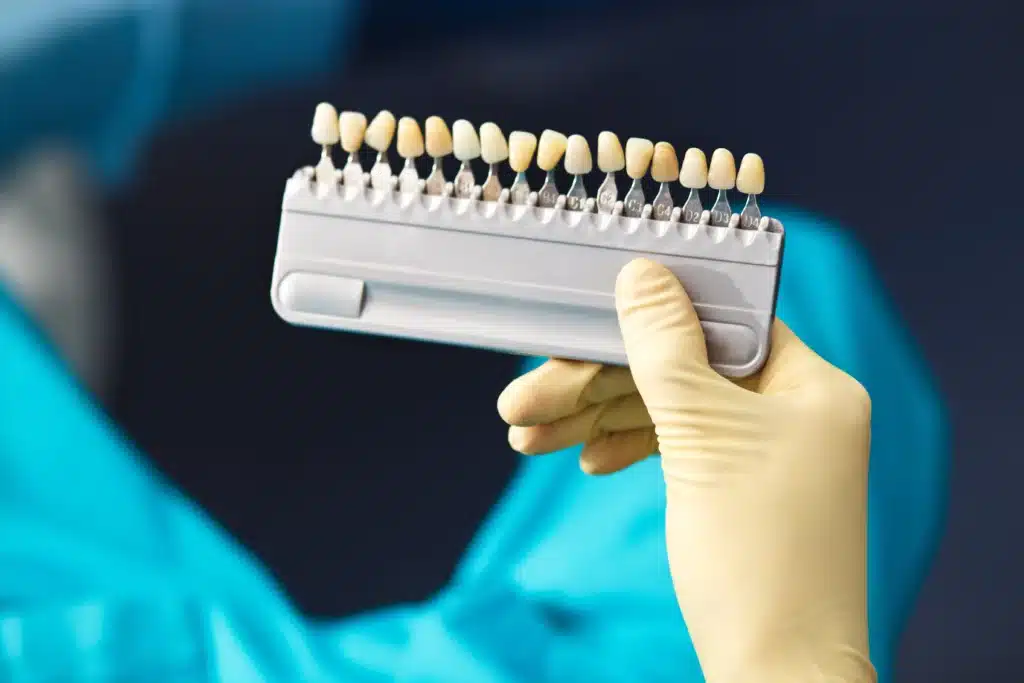
Teeth whitening services in Singapore are not just cosmetic enhancements; they are professional dental treatments. Beginning with a detailed consultation, your local dentist will evaluate the condition of your teeth to craft a personalised whitening strategy that aligns with your dental characteristics and aesthetic aspirations.
The heart of the treatment lies in the application of peroxide-based bleaching agents that delve beneath the enamel, targeting and oxidising the deep-seated stains that disrupt the natural whiteness of your teeth. Customised to each individual’s needs, the concentration of peroxide and the duration of its application may vary depending on the severity of discolouration and the desired outcomes.
It’s important to note that the most dramatic results are seen on teeth with a yellowish hue, as the treatment is specifically optimised for such cases. Brown or grey-toned stains might not respond as well. Additionally, teeth whitening does not affect the colour of dental restorations such as caps, veneers, dental implants and crowns, or fillings. Discolouration resulting from medications or trauma might also not be amenable to the whitening process.
Typically, the teeth whitening treatment will be completed within an hour. It commences with the application of a gum-protective gel, followed by the careful application of a hydrogen peroxide-based whitening agent by a professional dentist onto all visible surfaces of your teeth. Depending on the selected approach, an activating light might be employed for around 15 minutes to enhance the teeth whitening gel’s properties. Furthermore, comfort and customisation are prioritised throughout this treatment, ensuring a pleasant experience leading to a brighter smile.
Chairside and Take-Home Teeth Whitening
from S$450 onwards
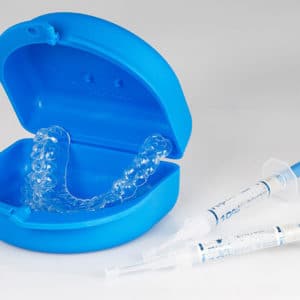
For the take-home teeth whitening kit, a customised tray is made which fits nicely over your teeth. You have to wear the whitening solution either overnight when you sleep or wear it as per the manufacturer’s or dentist’s instructions over a period of two weeks. The whitening solution comes in different concentrations depending on how white or light you want your teeth to be.
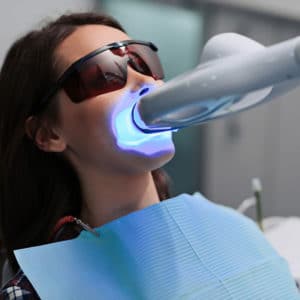
For chairside whitening, LED or LASER is used to activate the teeth whitening gel over three cycles of about 20 minutes per cycle in the dental office. This process has to be safely administered by professional dentists.
Here’s what you can expect during the teeth whitening process at our dental clinic:
Before beginning the treatment, our dentist will conduct an initial consultation to assess your dental health and suitability for teeth whitening. During this stage, the dentist examines the teeth for any underlying issues such as decay, gum disease, or dental restorations that might affect the outcome.
The next step involves professional teeth cleaning to remove any surface stains, plaque, and tartar. This ensures that the whitening gel can make direct contact with the tooth surface, which allows for more even and optimal results.
To help protect your gums and soft tissues, a barrier will be applied around the teeth. This step helps to shield sensitive areas from the bleaching agents used during the treatment, ensuring that only the teeth are exposed.
A whitening gel containing a bleaching agent, such as hydrogen peroxide or carbamide peroxide, is carefully applied to the surface of the teeth. The gel is left on for a specific amount of time, allowing it to break down stains on the enamel and help lighten the tooth surface.
Some teeth whitening treatments may include using an LED or laser light to activate the bleaching gel and help speed up the whitening process. The light helps enhance the results by penetrating the enamel more thoroughly.
Once the desired whitening effect is achieved, the dentist will rinse the gel off your teeth and evaluate the results. You’ll receive aftercare instructions to help maintain your new shade, such as avoiding staining foods and beverages for a few days.
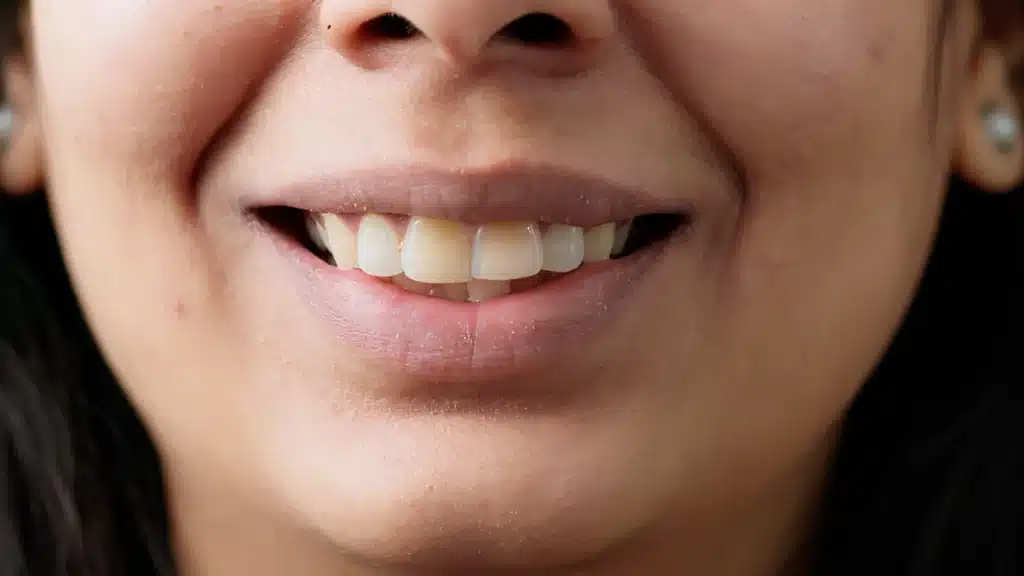
After your teeth whitening treatment, it is essential to follow proper post-treatment care to maintain the results and promote oral health.
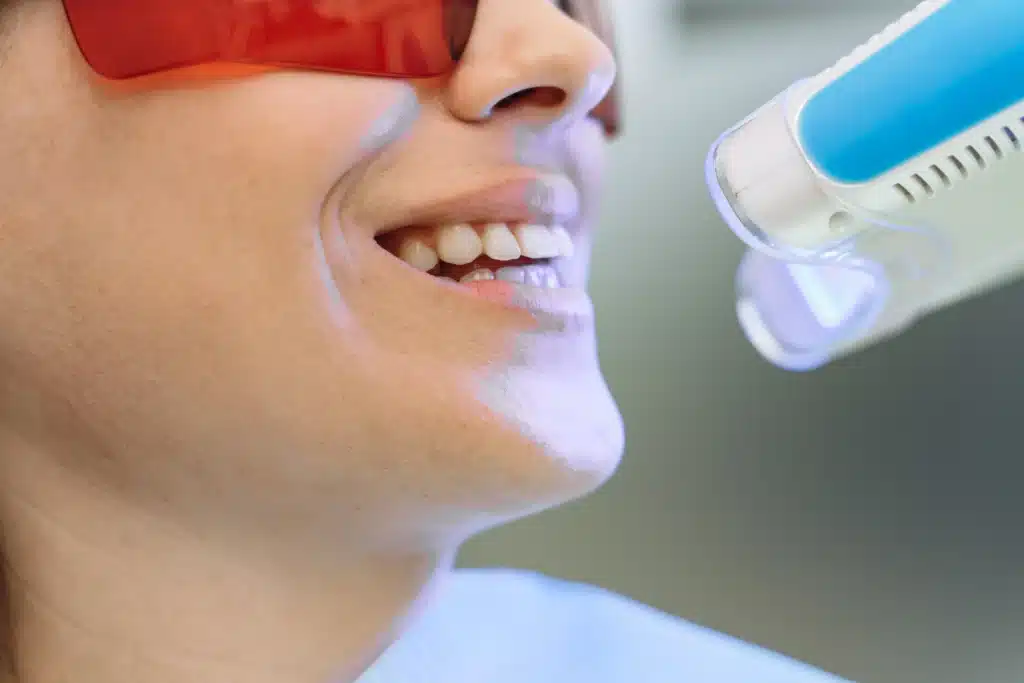
For a smooth teeth whitening experience and to minimise the risk of possible side effects, it is crucial to follow these guidelines:
Teeth whitening is a popular cosmetic treatment in Singapore, but it is not without potential side effects and risks. Patients should be aware of these possible complications before undergoing teeth whitening treatments.
One of the primary risks associated with teeth whitening is an increase in tooth sensitivity. This is particularly the case for patients who already experience sensitive teeth. The whitening agents can penetrate the tooth enamel and reach the dentin layer, which contains the nerve fibres. This process can exacerbate sensitivity, causing discomfort during and after the treatment.
The chemicals used in teeth whitening solutions may also pose a risk to the gums, potentially leading to irritation or ulceration. This occurs when the whitening product comes into contact with the gum tissue (gingiva) or the mucous membranes in the mouth, leading to a chemical burn or irritation. It is essential that the teeth whitening agent is applied carefully by a professional dentist and that any excess is removed promptly to minimise this risk.
In addition to sensitivity and irritation, teeth whitening can sometimes lead to mild discomfort and pain in the teeth and gums. This discomfort is usually temporary and often occurs as a result of the bleaching agents used during the treatment, which can cause a mild inflammatory response in the dental nerves. For some individuals, this pain can be a deterrent from undergoing or repeating the whitening process. It’s important for patients to discuss pain management options with their dentist prior to starting treatment, which may include the use of desensitising products or pain relief medications to help manage any discomfort that arises after the teeth whitening session.
Get to know the dentists who oversee the teeth whitening treatments at Family Dental Centre.

Dental Surgeon
BDS (Adelaide)
Dr. Gregory Kasdan is a dental surgeon with over 26 years of experience. After earning his Bachelor’s Degree in Dental Surgery with honours from the University of Adelaide, he continued to hone his dental skills in Melbourne’s private clinics before moving to Singapore in 2013.
Today, he continues to perform a wide range of dental treatments at our clinic, with a particular interest in cosmetic dental services, such as teeth whitening, all while ensuring a patient-first approach.
Dental Surgeon
BDS (Ireland)
Dr. Marzali Abdul Majid is a dedicated dental surgeon who earned his qualifications from the University of Dublin, Ireland. He has a strong interest in aesthetic dentistry, such as teeth whitening approaches, and places great emphasis on patient care and relationship building. Previously an active member of the Royal Academy of Medicine in Ireland, he draws on evidence-based practices to achieve optimal outcomes.
Teeth whitening is not recommended for children under the age of 16. This is because the pulp chamber, or nerve of the tooth, is enlarged during this age. Teeth whitening done on children under the age of 16 could cause their teeth to become sensitive.
Individuals with sensitive teeth and gums, receding gums and/or defective restorations should consult their dentist prior to using a tooth whitening system. Anyone allergic to peroxide (the whitening agent) should also not use a bleaching product.
It is advisable that teeth whitening is done only on patients with healthy teeth and gums. This means that there should not be any gum problems and that the teeth should be decay-free, or the patient may experience irritation to the gums and teeth. In addition, before any whitening is done, the teeth should be plaque/tartar-free so that the whitening gel can be in direct contact with the teeth. As such, dental scaling and polishing by a dentist needs to be done beforehand.
Teeth that exhibit uneven discolouration might present challenges to teeth whitening treatments, potentially leading to inconsistent or patchy results. Areas of the teeth that are discoloured differently may respond at varying degrees to the whitening process, which could accentuate the unevenness instead of addressing it. Additionally, it is important to recognise that teeth whitening treatments are ineffective on dental restorations such as crowns, veneers, and fillings. Since these materials do not respond to bleaching agents as natural tooth enamel does, they will remain unchanged, possibly leading to a mismatched appearance as the surrounding natural teeth become lighter.
For more information on teeth whitening, refer to our guide on the six essential things to know about teeth whitening in Singapore.
The ideal whiteness for your teeth is subjective and should complement your features. We recommend avoiding an unnaturally white shade that could look synthetic. A dentist can guide you to a shade that is both aesthetically pleasing and looks natural. This decision is influenced by factors such as your skin tone, facial features, and personal preferences. The aim is usually to achieve a balance where your teeth appear naturally white without being distracting or seeming out of place.
The time it takes to see results from teeth whitening varies depending on the method used. In-chair treatments may provide very apparent results on your teeth, appearing several shades lighter within a shorter period. On the other hand, Home kits typically require consistent application over a period of days or weeks. Results can be gradual and may vary based on the degree of discolouration and individual tooth response to the whitening agent. It’s important to have realistic expectations and to follow your dentist’s instructions for an optimal outcome.
At-home teeth whitening treatments usually involve using particular bleaching trays fitted to your mouth and filled with a professional-grade hydrogen peroxide bleaching gel. With this method, you might be able to see more lasting results after six to nine months.
When getting teeth whitening done through a dental practitioner, you’ll have access to stronger concentrations of bleaching agents. The effects of a chairside teeth whitening session performed in various clinics across Singapore will typically last anywhere from six months up to four years but may depend on factors such as lifestyle choices (e.g. excessively drinking coffee) and oral hygiene habits (e.g. proper brushing).
If needed, touch-ups can always be done down the line, so don’t worry if there are slight signs of discolouration showing up again over time, as these can be addressed via another exam with your dentist.
Permanent teeth whitening is not currently possible. All whitening treatments may need to be repeated over time to maintain the brightness of your teeth, especially if you consume staining foods or drinks or if you smoke. Good oral hygiene and occasional touch-ups may help in prolonging the effects, but the natural ageing process and lifestyle choices will eventually affect the colour of your teeth again.
If repeated teeth whitening treatments do not yield satisfactory results, it may be time to discuss alternative options with your dentist. Some teeth do not respond well to whitening due to deep intrinsic staining or other factors. In such cases, your dentist might recommend more permanent solutions such as dental veneers or crowns, which can help provide a more consistent and long-lasting tooth colour that may be harder to achieve with whitening alone.
Teeth whitening is generally considered safe when performed or prescribed by a dental professional. The key to safety is in the professional assessment of your teeth’s suitability for whitening and the proper use of whitening agents. Side effects may include tooth sensitivity and gum irritation, but these are usually temporary. It’s critical to use products approved by dental health authorities and to follow your dentist’s instructions to minimise risks. Moreover, regular checkups and consultations can assist in ensuring that your teeth whitening treatment is done properly.
Generally speaking, professional teeth whitening done by a professional dentist is less likely to cause any pain or discomfort for most patients when performed correctly. At-home bleaching systems are also considered relatively mild and often do not cause much discomfort. Any sensitivity in your gums or teeth, side effects usually only last for a few days afterwards with no other long-term problems.
Patients in Singapore are recommended to be at least 16 years of age before undergoing teeth whitening.
If you have the following dental issues, please consult with your dentist before pursuing teeth whitening:
People with peroxide allergies should also avoid teeth whitening products as peroxide is typically a main ingredient.
Teeth discolouration is a common issue that affects many individuals, including those in Singapore. It can result from a variety of causes, which can generally be categorised as extrinsic or intrinsic factors. Extrinsic causes refer to external factors that stain the surface of the teeth, while intrinsic causes pertain to changes within the tooth structure that affect the colour of teeth.
Extrinsic causes of teeth discolouration include the consumption of certain foods and beverages. Common culprits are wine, coffee, and tea, which are known for their staining properties. These items are often consumed regularly and can lead to the gradual staining of the teeth’s surface. Additionally, the use of tobacco products is a significant contributor to extrinsic stains on the teeth.
Intrinsic causes of teeth discolouration are related to factors that affect the internal structure of the teeth. One of the intrinsic factors is the natural ageing process, which can cause changes to the dentin, the inner tissue of the tooth, leading to a darker or yellowish appearance. This type of discolouration can also be exacerbated by prolonged exposure to acidic foods, which can erode the enamel and expose the darker dentin underneath.
Another intrinsic factor that can cause discolouration is the damage caused to a tooth’s outer layer due to aggressive brushing or tooth root infections. Aggressive brushing can wear away the enamel over time, and infections can cause discolouration from the inside out.
To find out whether you are a good candidate, schedule an appointment with our dental clinician for
an initial consultation. Once the assessment of your dental health is done, our clinician will work with
you to develop a treatment plan that is right for you.
Since its inception in 2003, Family Dental Centre (FDC) has grown into a network of dental clinics in Singapore, driven by the mission to provide reliable and accessible dental care to the community. As part of the Oracare Group and recognised by both the Singapore Medical Council and the Ministry of Health, our focus is on upholding high standards in dental services, a commitment that has led to our inclusion in Dental Asia and listing on HealthHub, Singapore’s leading health portal.
At FDC, understanding and meeting the individual needs of our patients is at the heart of what we do. Our expansion to 12 conveniently located clinics is a reflection of our commitment to making dental care accessible to all, supported by a team of 32 dental surgeons. Continuous professional development is key, ensuring our team is equipped to provide personalised and optimal care. In recognition of Singapore’s diverse culture and languages, our staff are conversant in English, Mandarin, and Malay, facilitating clear and effective communication with our wide-ranging clientele.
Choosing Family Dental Centre means opting for a partner committed to your long-term dental health. Learn more about FDC and discover how we can be part of your dental care journey.
Menu
Services
Preventive Dentistry
Restorative Dentistry
Cosmetic & Aesthetic
Dentistry
Teeth Aligners &
Straightening
Why Us